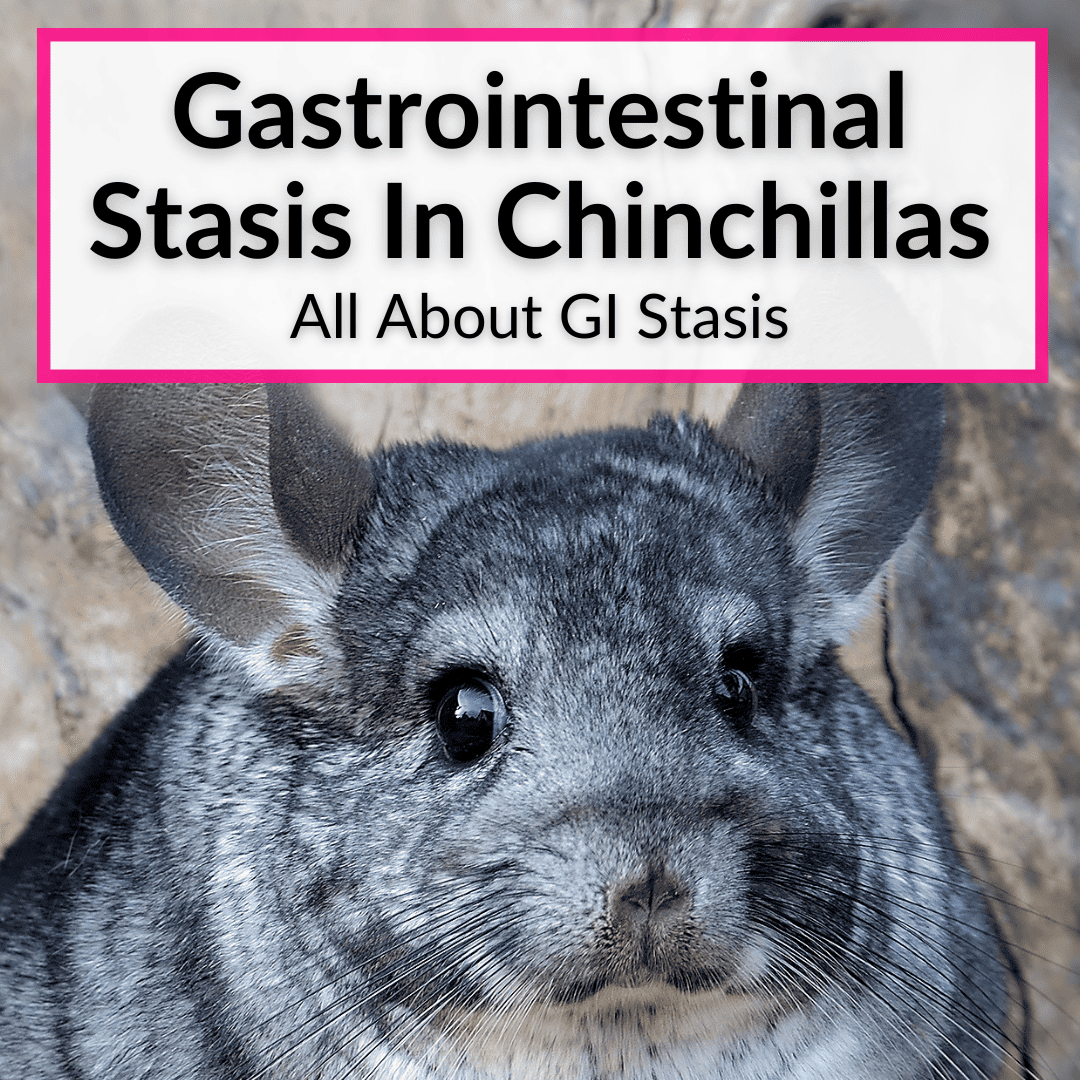
Reading a quick overview of chinchilla GI stasis doesn’t sound so bad.
It’s basically just constipation, right? Well, yes.
But constipation in a chinchilla is deadly. And fast!
Gastrointestinal stasis in chinchillas is no trifling matter. You pet could die in a matter of hours.
That’s why you need to know how to recognize this issue and what to do about it.
Keep reading to learn just that. We will also cover ways to prevent it from happening in the first place, which is obviously the ideal scenario.
Contents
Gastrointestinal Stasis In Chinchillas
Gastrointestinal stasis, or GI stasis, is a fatal condition that slows down the passage of food through a chinchilla’s GI tract. It is mainly caused by a change in the GI bacteria, resulting in painful gas and bloating.
Poor diet, ingesting a foreign object, dehydration, or hairballs are some of the main culprits of GI stasis in chinchillas. Treatment for GI stasis includes fluid therapy for rehydration, intestinal motility drugs, pain relief medications, antibiotics, and syringe feeding.
Let’s take a closer look at the possible causes of chinchilla GI stasis. After that, we will get into treatment, prevention, and everything else you need to know.
Causes Of Chinchilla GI Stasis
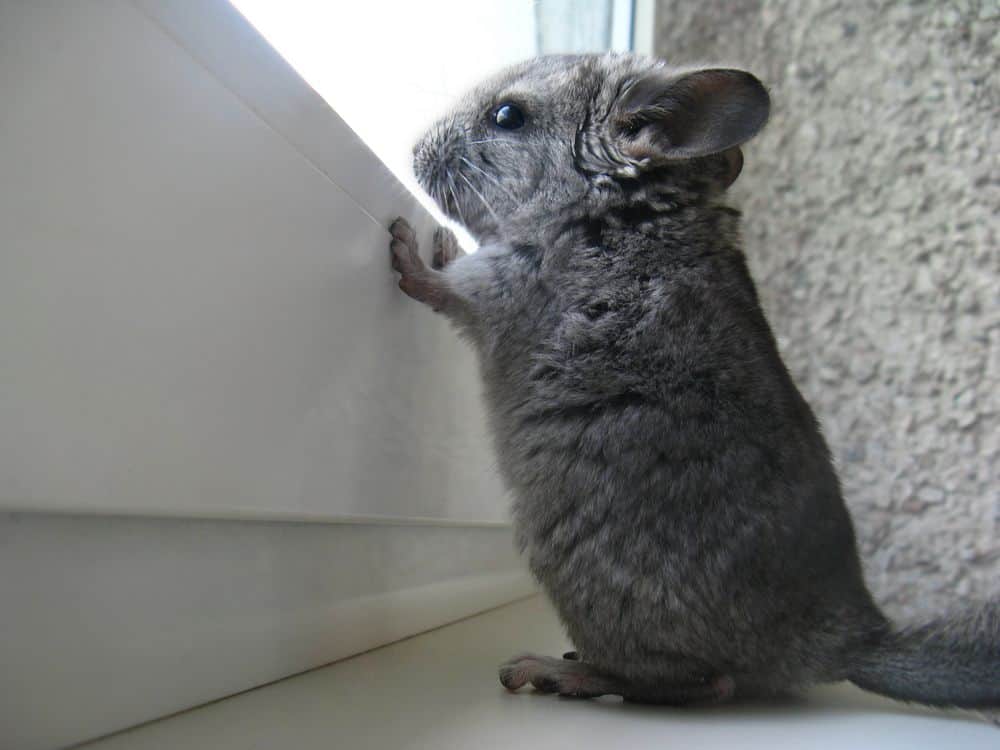
The following factors may contribute to gastrointestinal stasis in chinchillas.
A Diet High In Carbohydrates
One of the leading causes of GI stasis in chinchillas is a diet that is too low in fiber and too high in carbohydrates. This is common if you feed your chinchilla food pellets that are not specifically made for them, or if you only feed it pellets.
Commercial chinchilla pellets usually contain more carbohydrates and less digestible fiber than a chinchilla needs. This can result in less of the good bacteria needed for fermenting and digesting the hay. This, in turn, affects the movement of feces, resulting in GI stasis.
Your chinchilla needs a steady supply of high-quality Timothy hay, in addition to its daily portion of pellets, to improve healthy gut bacteria and GI motility and prevent stasis.
Stress
A stressed chinchilla might stop eating, or eat less hay and grass. That, in turn, could cause an imbalance in the gut bacteria and reduce motility.
Many factors can cause stress in chinchillas: a new chinchilla in the household, improper cage location and cage size, unhygienic environment, a sudden change in the environment, etc.
Lack Of Exercise
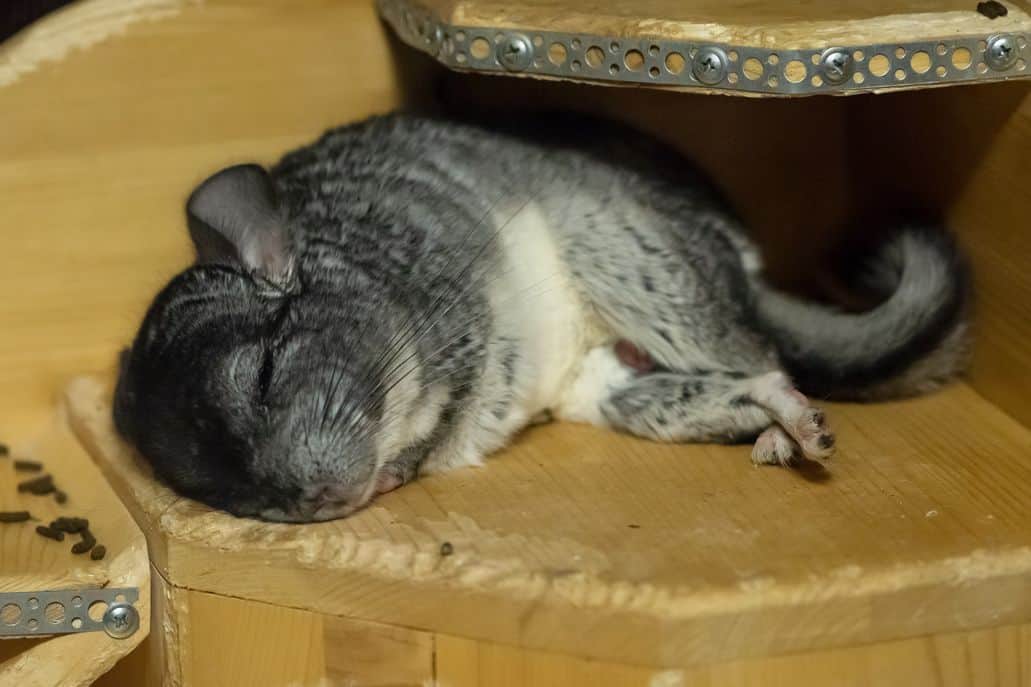
Like humans, chinchillas need daily physical activity to keep their bowels functioning normally. Without exercise, your pet is more likely to have a poor appetite, which, in turn, reduces the roughage it needs to keep its gut functioning normally. This can result in stasis and impaction.
Dental Or Other Oral Issues
A chinchilla with dental issues like overgrown teeth, impacted teeth, and dental abscesses may stop eating, slowing down food motility in the gut.
Dehydration
Chinchillas need a steady supply of fresh drinking water. If your pet’s water bowl is dirty or its bottle is clogged or leaking, it may not drink adequate water, resulting in dehydration and stasis.
Other Health Issues
Other systemic health issues in chinchillas, like liver or kidney problems, can also contribute to GI stasis. These issues often increase the gas-producing bacteria and impact the pH of the gut. This can slow down the movement of food, resulting in a dry mass that impacts the chinchilla’s intestines.
Physical Obstructions
Swallowing a foreign object, such as a piece of cloth, a pipe, or even its own hair, can also disrupt normal food movement in the chinchilla’s gut, causing GI stasis.
How To Treat GI Stasis In Chinchillas
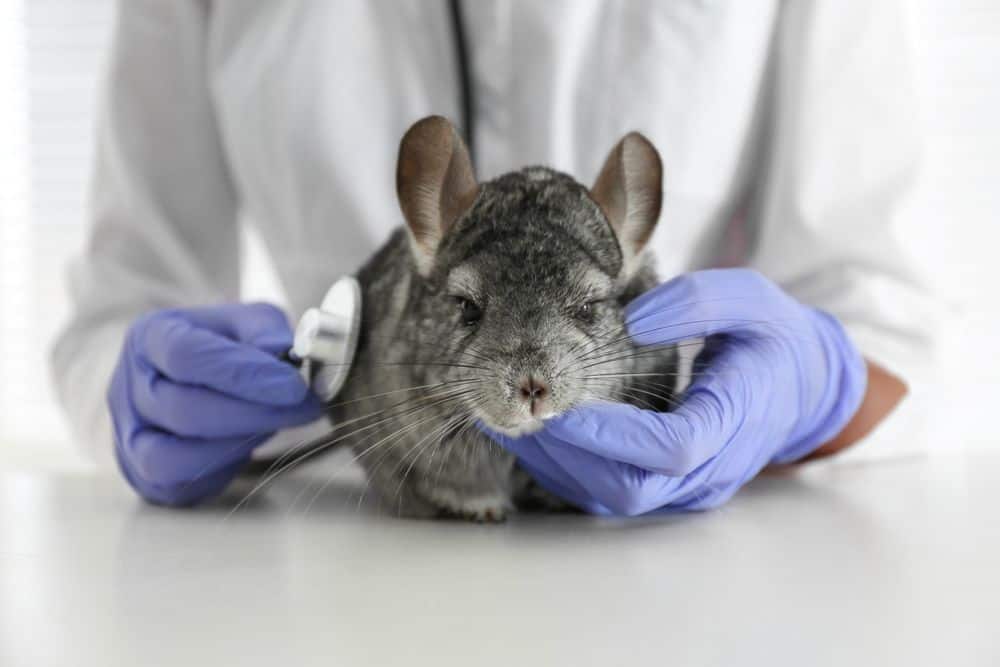
If your chinchilla is not eating or pooping, is showing lethargy, or is hunched over due to abdominal pain, please take it to the vet right away. It could be GI stasis which is a silent killer in chinchillas. Your vet will conduct a series of tests (including X-rays) to diagnose stasis. They might start the following therapy.
Motility Drugs
Intestinal motility drugs, like cisapride or metoclopramide, help get the bowels moving. These drugs are safe and effective for small animals like chinchillas.
IV Therapy With Medicines
The vet will administer IV fluids to soften the dry mass of food and hair stuck in the intestines. This can help get things moving again.
The buildup of gas can cause extreme pain in the chinchilla. By administering pain medications, the vet will try to alleviate some of the discomfort.
Sometimes, a chinchilla with GI stasis may need antibiotics to counter the harmful bacteria in the gut. However, antibiotics should be used with caution, because they also eliminate healthy bacteria.
Syringe Feeding
If your chinchilla is not eating, the vet may recommend syringe feeding to ensure that it gets vital nutrients.
How Long Can A Chinchilla Go Without Pooping?

You might have read my article about this: chinchillas poop a lot! They tend to poop at least 250 times a day. This means that your chinchilla spends almost all of its time awake eating and pooping.
A healthy chinchilla should produce almost 20 to 30 poop pellets per hour. If your pet has not pooped even once in 8 hours, please take it to the vet immediately.
The most likely cause of a chinchilla not pooping is a blockage or GI stasis. It is important to get the issue diagnosed and treated right away. Left untreated, GI stasis can rapidly cause the gut tissues to die and could kill your chinchilla in a matter of hours.
Why Is My Chinchilla Not Pooping?
Here are some main reasons a chinchilla may be having difficulty pooping.
Poor Diet
An inadequate diet lacking in roughage, or fiber, is the most likely cause of constipation in chinchillas. Perhaps you are feeding too many commercial chinchilla pellets that are rich in carbohydrates but lacking in fiber. Remember that chinchillas need a steady supply of hay they can snack on throughout the day.
Dental Or Other Health Issues
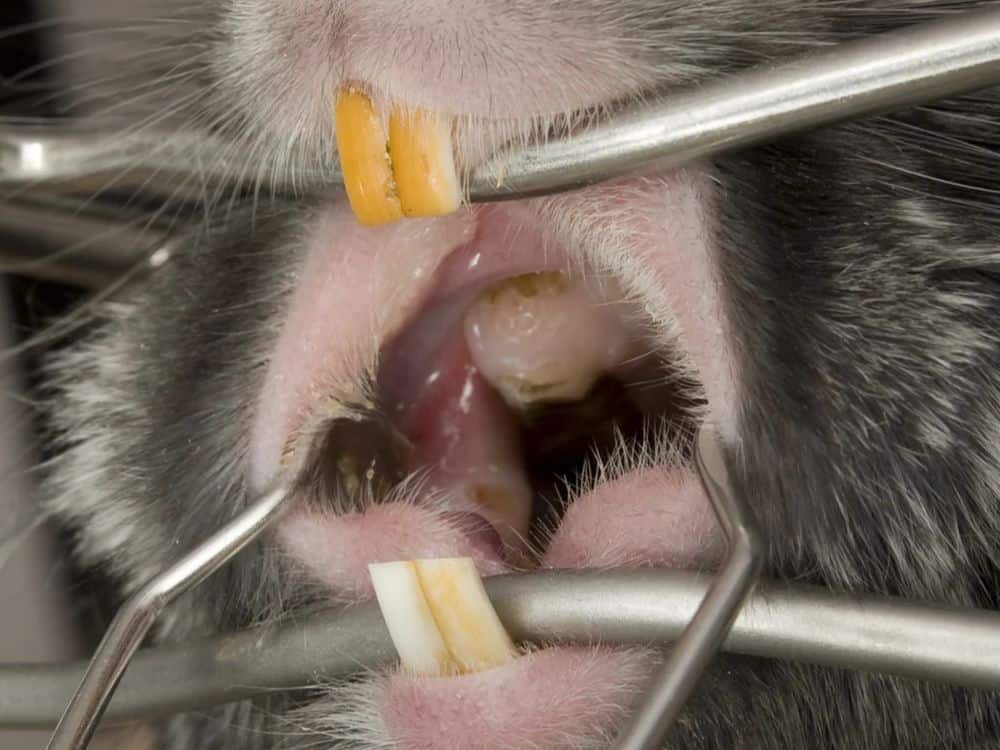
If your pet is suffering from dental abscesses, overgrown teeth, or gum issues, then it may not eat and may get constipated. Similarly, kidney or liver problems could also cause a lack of appetite and subsequent constipation.
Pain (Non-Dental) Or Stress
An external wound, injury, fractured tail, and stress can all result in a lack of appetite and constipation in small pets like chinchillas.
Inadequate Water-Intake
If the chinchilla enclosure does not have fresh water available at all times, or if the water bottle is leaking or the water is dirty, your pet may suffer dehydration, which can stop it from pooping.
How Do You Fix A Constipated Chinchilla?
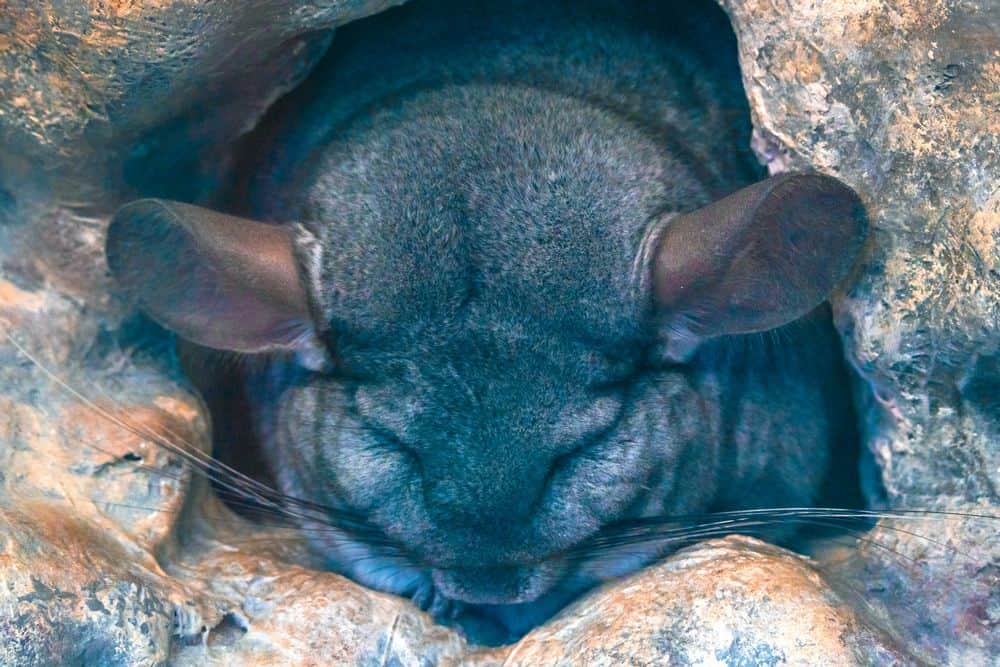
Your chinchilla may be constipated if it hasn’t pooped even once in a couple of hours. Its stomach may appear bloated or distended, and it might not eat. Here are the steps you can take to fix your constipated pet.
Offer A Small Dose Of Chinchilla Laxative
A pet store can help you with some rabbit laxatives or small-pet laxatives. Offer a few drops of it to your pet. Follow the label’s instructions. You can also give your pet a few drops of olive oil to stimulate it to poop. But remember that olive oil is full of fat, so do not give too much.
Encourage Your Pet To Move
You can also kickstart your chinchilla’s sluggish digestion by encouraging it to move. Attach a safe running wheel to its enclosure or let it outside in a playpen to get it running and moving. Add some toys, balls, or blocks that your pet can push and roll around. The more cardio your chinchilla does, the more likely it is to poop.
Have It Drink Water
Even if the workout does not result in poop, your chinchilla will get thirsty afterward. Bring it back inside its cage and offer it some fresh drinking water. Water will provide hydration and stimulate its bowels.
Provide Hay
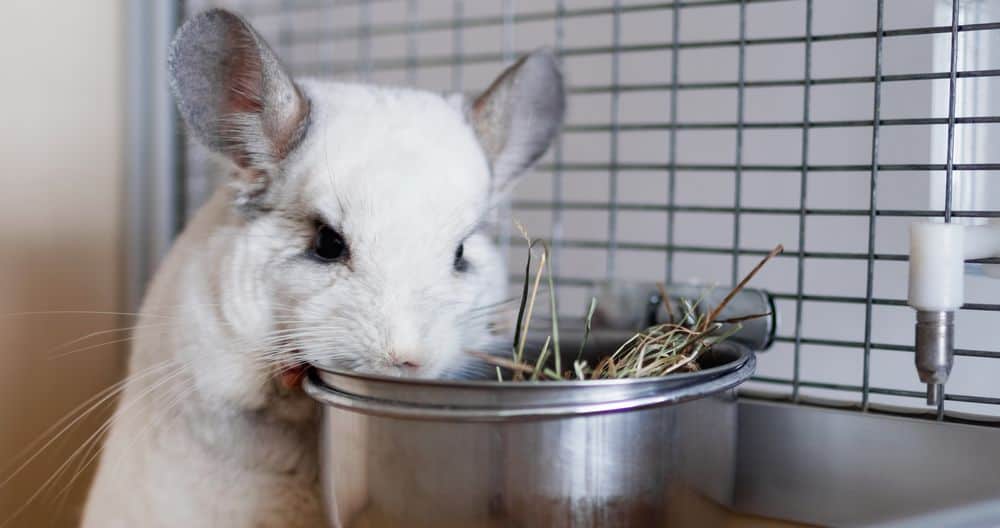
Fresh Timothy or meadow hay is the best form of fiber for providing roughage and preventing constipation in chinchillas. Get your buddy to eat hay and remove all commercial pellets and other dry food from its enclosure until it eats more hay
GI Stasis Chinchilla: Final Thoughts
Gastrointestinal stasis in chinchillas is a serious health problem. With GI stasis, chinchillas can go from looking fine to dead in a matter of hours. If you notice any of the symptoms above, do not hesitate to contact your vet.
But why let it get that far in the first place? Feed your chinchilla a healthy diet of hay and pellets, provide it a steady supply of water, give it a comfortable and stress-free living space and allow it out for exercise daily. That way, your pet is unlikely to ever suffer from GI stasis at all.
Leave a Reply